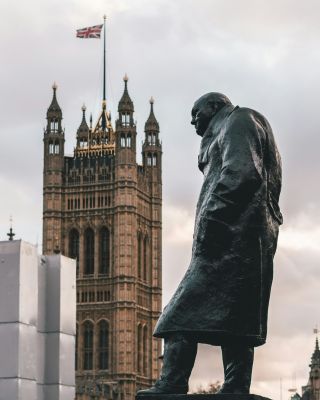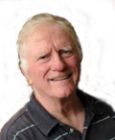Memory
Winston Churchill: A Military Scene as a First Memory of Life
From toy soldiers to a world historical figure.
Updated May 24, 2024 Reviewed by Monica Vilhauer
Key points
- Winston Churchill's early recollection relates to his long and productive life.
- The theme of Churchill's first memory involves a promise of adventure and opportunity.
- Reflecting on his early recollection contributes to empathically understanding Churchill's purposeful life.

Winston Churchill's earliest memory, at age three or four, involved a civic and military celebratory scene. Churchill recounted the remembrance in book on his early childhood: "I remember my grandfather, the Viceroy, unveiling the Lord Gough statue in 1878. A great black crowd, scarlet soldiers on horseback, strings pulling away a brown shiny sheet, the old Duke, the formidable grandpa, talking loudly to the crowd. I recall even a phrase he used: 'and with a withering volley he shattered the enemy's line.' I quite understood that he was speaking about war and fighting and that a 'volley' meant what the black-coated soldiers (Riflemen) used to do with loud bangs so often in the Phoenix Park where I was taken for my morning walks."
The theme of Churchill's early recollection suggests a splendid opportunity for adventure and wonder in life. While Churchill's first memory involves military pageantry and civic celebration, the remembrance more broadly relates to exploring and finding passions in life that are challenging and fulfilling. Churchill was born in 1874 and died at age 90 in 1965. During his rich and consequential life, he saw action in four military campaigns, was a military and national leader in a historic period during World War II, and twice was elected Prime Minister of Great Britain. Beyond his military and political positions, Churchill was a war correspondent, escaped from captivity as a prisoner of war, published 58 books, and was a recipient of the Nobel Prize for Literature.
Regarding the dimensions of personality, as in his first memory, Churchill demonstrated a high degree of activity in life. As a renowned author, he constantly refined his craft and produced a prolific body of work. Churchill traveled across the world as a soldier, statesman and celebrity. There were few periods in Churchill's life that he was not engaged in educational, military, civic or political affairs. With respect to the personality dimension of social interest, Churchill identified with other living beings and felt a strong sense of belonging with the British and world community, fellow military personnel, and a multitude of friends and family members. Churchill's fervor to serve the British population in the early 1940's is captured in his famous and inspiring words, "I have nothing to offer except blood, toil, tears and sweat."
Relating to optimism/pessimism, Churchill had an optimistic perspective on life. Throughout his student years of notable failures, perilous military battles, looming threats from Nazi air attacks, and political defeats, Churchill maintained expectations for favorable outcomes. In this regard, Churchill wrote, "Success is going from failure to failure without the loss of enthusiasm." At the same time, Churchill experienced a pattern of depressive episodes over the course of his life. Churchill's expression of self-efficacy was high when encountering challenges and adversities. For Churchill, leading Great Britain during the war years with the constant threat of a ruined and defeated nation was the ultimate challenge. In this regard, he said, "Never, never, never give up."
In keeping with the discipline and self-control required by the military formations and public celebrations in his early recollection, Churchill demonstrated a high level of conscientiousness in his life. With perseverance and an assumption of responsibility, Churchill found success as a historian, politician, government and world leader over a period of decades. Although he often presented himself in a casual manner, riding a horse, smoking a cigar, holding a drink, or enjoying more that a taste of food, Churchill led a disciplined and industrious existence.
Turning to perceptual modalities, reflecting observations in his first memory, Churchill was attuned to color. He found various hues in natural environments and human adornments to be emotionally uplifting. Colors in military regalia, flowers in a field, and the span of the ocean added to the richness of life for Churchill. As an adult, watercolor painting provided him a respite from governmental and civic demands and were mood-enhancing.
Relating to the senses, as in his first memory, Churchill's visual endowment is prominent and distinct. As a soldier, an artist, a writer of history, and in political endeavors, Churchill fully engaged his visual capacities. Churchill's sense of hearing is notable in his early recollection and in his life. Throughout his ninety years, he appreciated the endowment of speech and hearing through his oratory, lively and spirited conversations, use of the telephone and listening to the radio.
With respect to objects in his early recollection, they are distinct and prominent: soldiers, horses, flags, and a statue. As a child, Churchill had a large collection of toy soldiers. Over much of his life, related items, including weapons, maps, ships and tanks, were familiar to Churchill. Finally, the place or location of Churchill's first memory is notable in its pageantry and historical significance. On numerous occasions, including sites of public lectures, meeting with world leaders, and participating as a member of Parliament, Churchill appeared in ceremonial places.
The first memory of a number of historical figures is available in written accounts of their lives. For Winston Churchill, reflecting on his early recollection contributes to empathically understanding a remarkable and purposeful life.


